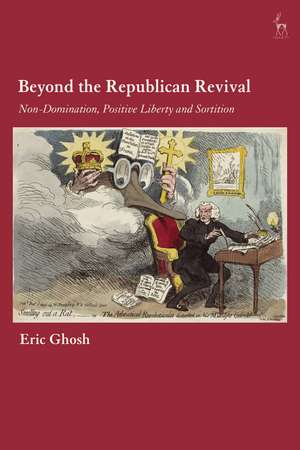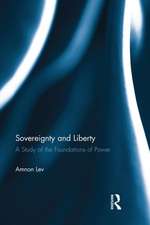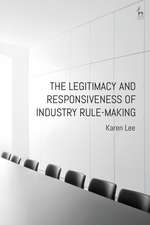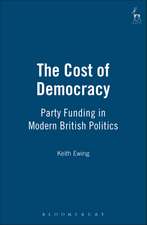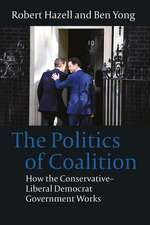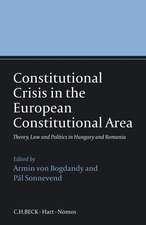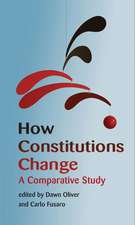Beyond the Republican Revival: Non-Domination, Positive Liberty and Sortition
Autor Eric Ghoshen Limba Engleză Hardback – 28 oct 2020
| Toate formatele și edițiile | Preț | Express |
|---|---|---|
| Paperback (1) | 218.18 lei 6-8 săpt. | |
| Bloomsbury Publishing – 27 iul 2022 | 218.18 lei 6-8 săpt. | |
| Hardback (1) | 498.73 lei 6-8 săpt. | |
| Bloomsbury Publishing – 28 oct 2020 | 498.73 lei 6-8 săpt. |
Preț: 498.73 lei
Preț vechi: 689.23 lei
-28% Nou
Puncte Express: 748
Preț estimativ în valută:
95.43€ • 99.91$ • 78.96£
95.43€ • 99.91$ • 78.96£
Carte tipărită la comandă
Livrare economică 05-19 aprilie
Preluare comenzi: 021 569.72.76
Specificații
ISBN-13: 9781509925469
ISBN-10: 1509925465
Pagini: 264
Dimensiuni: 156 x 234 mm
Greutate: 0.54 kg
Editura: Bloomsbury Publishing
Colecția Hart Publishing
Locul publicării:London, United Kingdom
ISBN-10: 1509925465
Pagini: 264
Dimensiuni: 156 x 234 mm
Greutate: 0.54 kg
Editura: Bloomsbury Publishing
Colecția Hart Publishing
Locul publicării:London, United Kingdom
Caracteristici
Provides a fresh interpretation of liberty through an alternative reading of key thinkers within the tradition of political and constitutional theory
Notă biografică
Eric Ghosh is Senior Lecturer in Law at the University of New England, NSW, Australia.
Cuprins
1. Introduction I. Introduction II. Positive-Liberty Republicanism III. Non-Positive-Liberty Republicanism IV. Political and Constitutional Theory V. Chapter OutlineVI. Conclusion PART ILIBERTY AS NON-DOMINATION2. Pettit's Narrative of the Eclipse of Republican Liberty I. Introduction II. Pettit's Account III. Price IV. Lind V. Bentham VI. Paley VII. Tracking Liberty as Non-Domination Aft er 1785 VIII. Conclusion 3. Skinner's Republican and Liberal Liberty I. Introduction II. Skinner's Account of Republican Liberty III. Examining Skinner's Republican Liberty IV. Skinner's (and Pettit's) Interpretation of Liberal Liberty V. Conclusion 4. The Challenge of Liberty as Non-Interference I. Introduction II. Pettit's Analytical Account III. Kramer's Critique and Two Challenges to Liberty as Non-Domination IV. The Distinctiveness of Liberty as Non-Domination V. The Damage Caused by Arbitrary Power and Looking Beyond Liberty VI. Public Domination, Democracy and Constitutionalism VII. Conclusion 5. Vindicating Liberty as Non-Domination I. Introduction II. Priceian Liberty as Non-Domination III. Applicability of Chapter Four's Challenges to Liberty as Non-Domination IV. The Assumption of Likely Interference V. Applying Priceian Liberty as Non-Domination VI. Conclusion PART IIPOSITIVE LIBERTY6. Positive-Liberty Dimensions in the Republican Revival I. Introduction II. Negative and Positive Liberty in Nineteenth- and Twentieth-Century Political Thought III. A Classification of Conceptions of Liberty and its Application to Pettit and Skinner IV. Positive-Liberty Dimensions in Historical Writing V. Conclusion 7. Michelman's Republicanism I. Introduction II. The Republican Tradition and Positive Liberty III. The Contemporary Appeal of Positive Liberty IV. Constitutional Implications of Republican Liberty V. Returning to the Historical Writers VI. Conclusion PART IIISORTITION8. A Citizens' Court: Foundations I. Introduction II. The Republican Tradition and Constitutional Juries III. Assessing Institutional Arrangements IV. Deliberative Polls and the Counter-Majoritarian Difficulty V. Conclusion 9. A Citizens' Court: The Proposal I. Introduction II. The Proposal III. A Comparison with Sortition in Parliament IV. A Comparison with Strong-Form Judicial Review V. Zurn's CritiqueVI. Conclusion 10. Conclusion
